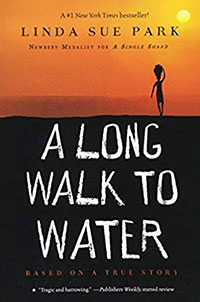I experienced two very different things this week: I revisited some speeches by the incomparable Toni Morrison after I learned of her death. And I watched a recent video about education. I hope not only the timeliness but also how these two intersect will become clear as you read on.
A recent video that is posted on Colorín Colorado focuses on English language learners (ELLs) in Dearborn, Michigan. It is entitled You Are Welcome Here .

In it, this successful middle school program uses quality children’s literature (among other things) to not only help develop language, but open kids up to sharing what they’ve experienced.
The middle school students — all English language learners — are reading and sharing their thoughts about Linda Sue Park’s A Long Walk to Water . This powerful book is set in Sudan, but touches the young readers who emigrated from Yemen.
That these children related to the book doesn’t surprise me. It is notable how the teachers used this book (and I’m sure, others) to develop and enhance relationships — connections — with the children.
I’m reminded of what Toni Morrison suggested in her 1993 Nobel Lecture : “The vitality of language lies in its ability to limn the actual, imagined, and possible lives of its speakers, readers, writers.” Clearly, Park’s book, A Long Walk to Water, described something that, depending on the readers’ experiences, described both the actual and imagined.
Words have meaning, power, and consequences; often positive, sometimes hurtful. Words become literature. They bring the past into the present, make old new again, evoke response, inform, and more. When used well, literature — language — provides connective tissue helping connect people.
And what is more powerful than that?
Watch the video
